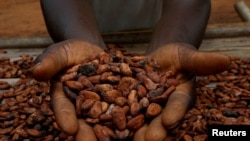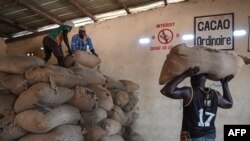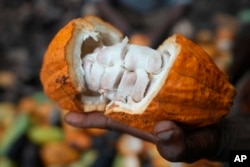"In 20 years I have never seen a harvest like this," lamented Siaka Sylla, president of a trade cooperative of 1,500 farmers in Divo, southern Ivory Coast.
"The rain has spoiled our crops," he told AFP in an interview.
With those troubled harvests, demand is way outstripping supply. Cocoa prices have more than doubled since the start of 2023.
The rocketing prices risk threatening demand, at a time when the world's major economies are already grappling with elevated inflation.
Meteoric rise
The cocoa market extended its meteoric rise this week.
On Tuesday, the London price of cocoa scaled an all-time pinnacle at £4,248 per ton and New York hit a 46-year high point at $5,288 per ton.
"It seems only a matter of time before the cocoa price in New York approaches the all-time high of $5,379 per ton set in 1977," noted Commerzbank analyst Carsten Fritsch.
Prices last year topped previous peaks from 2011, when the market had been rocked by fears over the impact of post-election violence in Ivory Coast.
Declining production has been a major catalyst for the price explosion over the past 12 months.
An increasing number of farmers in West Africa have reported plant diseases after particularly heavy rains that favored the spread of black pod disease, which blackens and rots pods.
The plant needs a delicate balance of alternating sunshine and precipitation in order to flourish.
Last July was a particularly rainy in Ivory Coast's south, just as plants were flowering.
As a result, Ivorian regulator the Coffee-Cocoa Council suspended the sale of export contracts.
"It's a very tough crop. We will reach perhaps 1,900 tons compared to almost 3,000 tons last year," Sylla told AFP.
"But there are cooperatives where it is worse, not even 200 or 300 tons."
Industry estimates suggest cocoa shipments at Ivory Coast ports tumbled by 35 percent between October and the end of January from a year earlier.
El Nino threat
Producers face fresh turmoil due to the resurgence of the El Nino climate phenomenon threatening western Africa.
"This means that the cocoa market is also likely to face a supply deficit in the current 2023/24 crop year, the third in a row," warned Fritsch.
El Nino unleashes freak weather, causes drought in some areas and flooding in others, and is expected to last until April.
"Traders are worried about another short production year and these feelings have been enhanced by El Nino that is threatening West Africa crops with hot and dry weather," added analyst Jack Scoville at Price Futures Group.
Climate change is already posing a major challenge for farmers.
In Ghana, six regions grow the cocoa bean: the Eastern, Ashanti, Brong Ahafo, Central, Volta and Western regions.
However, due to dwindling soil fertility and fluctuating rainfall, production has shifted towards the west of the nation.
Top global producer Ivory Coast and number two Ghana together accounted for almost 60 percent of the 2022/2023 worldwide harvest, according to estimates from the Abidjan-based International Cocoa Organization (ICCO).
















Forum